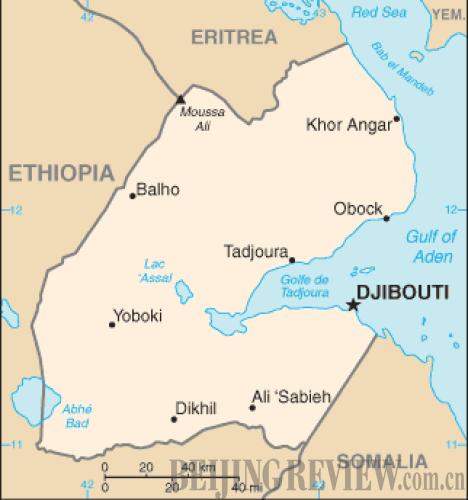| 
Perched at the mouth of the Red Sea, Djibouti has long been a strategic focal point for the world's shipping companies. Perhaps it is poetic symmetry that a nation, which has been home to nomadic wanderers for thousands of years, is now a vital stopover for the modern world's great voyagers - commercial cargo ships - as they travel around the globe.
That nomadic tradition lives on in Djibouti. While about two thirds of the country's population lives in the capital, the remainder are mostly nomadic herders. It is said that much of the country's history is captured in the songs, poems and folklore of this nomadic tradition.
Bordered by Ethiopia, Eritrea, Somalia and with a coastline of 314 km, Djibouti is blessed with an ideal port in the capital city, also called Djibouti. The landscape is mainly semi-arid desert with scattered plateaus and highlands. The most fascinating feature of Djibouti's landscape is Lac Assal, the lowest point in Africa, with its shoreline at 155 meters below sea level. It is also the most saline body of water outside Antarctica.
France bought the anchorage of Obock in 1862 and set about expanding it into a colony, which it named French Somaliland. When Somalia gained independence from France in 1960, modern day Djibouti held a referendum in which it decided to remain under France rather than join the new Somalian Republic. The nation eventually became independent in 1977.
With few exports, Djibouti's economy is mainly dependent on its strategic location on the Red Sea and Gulf of Aden. The Port of Djibouti is an important refueling point for international shipping companies and a number of nearby landlocked countries use Djibouti's transport facilities to export their goods.
There is little development of agriculture or industry as economic contributors. The scarcity of rainfall means that crop production is limited to vegetables and fruit and most food is imported. Job creation and poverty reduction remain major challenges.
But there are positive signs: since 2001, Djibouti has become a destination for capital investment from the private sector and now attracts more that $200 million in foreign direct investment annually. The country has greatly improved its finances in recent years and achieved a growth rate of approximately 6.5 percent in 2009.
Bilateral political relations
China and Djibouti established diplomatic relations in 1979. Since then, many high-ranking Chinese officials have paid visits to Djibouti. Former Djiboutian President Gouled Aptidon made official visits to China in 1979, 1991, 1994 and 1998.
Djibouti President Ismail Omar Guelleh attended the Beijing Summit of the Forum on China-Africa Cooperation in November 2006.
In December 2009, Mahamoud Ali Youssouf, Djibouti Minister of Foreign Affairs and International Cooperation, visited Beijing at the invitation of Chinese Foreign Minister Yang Jiechi.
Trade relations
The two nations have signed an agreement on economic and technical cooperation. Statistics show the growing importance of the economic relationship: bilateral trade volume increased from $49.8 million in 2002 to $196.93 million in 2008.
Several Chinese construction firms have set up in Djibouti and like many large economies, China relies on Djibouti's port for sending goods to East Africa, a relationship that provides ongoing impetus for the local economy.
Cooperation in culture
China and Djibouti have cooperated in the fields of culture, education and health. China began providing scholarships for Djibouti students in 1996. Since 1980, China has been sending medical teams to Djibouti.
Capital: Djibouti
Population: 740,528 (July 2010 est.)
Climate: Warm, dry desert climate; hottest from June to August
Languages: French (official), Arabic (official), Somali, Afar
Religion: Muslim 94 percent, Christian 6 percent
Currency: Franc (DJF) $1 = 175.8 DJF
President: Ismaïl Omar Guelleh
Republic of Djibouti
June 27, 1977 |